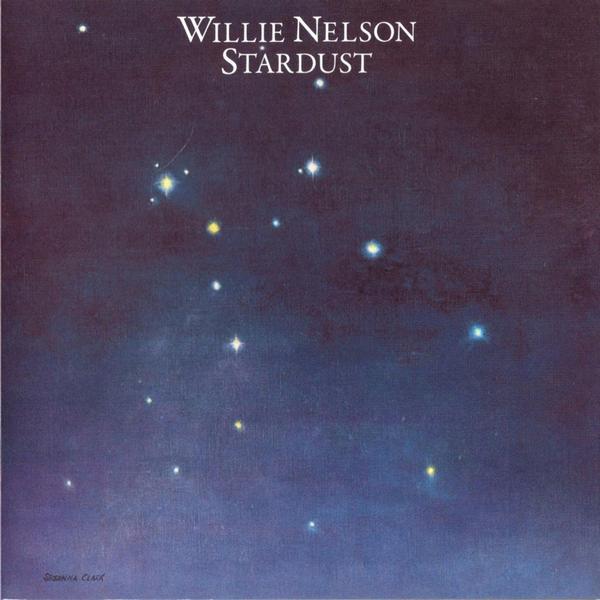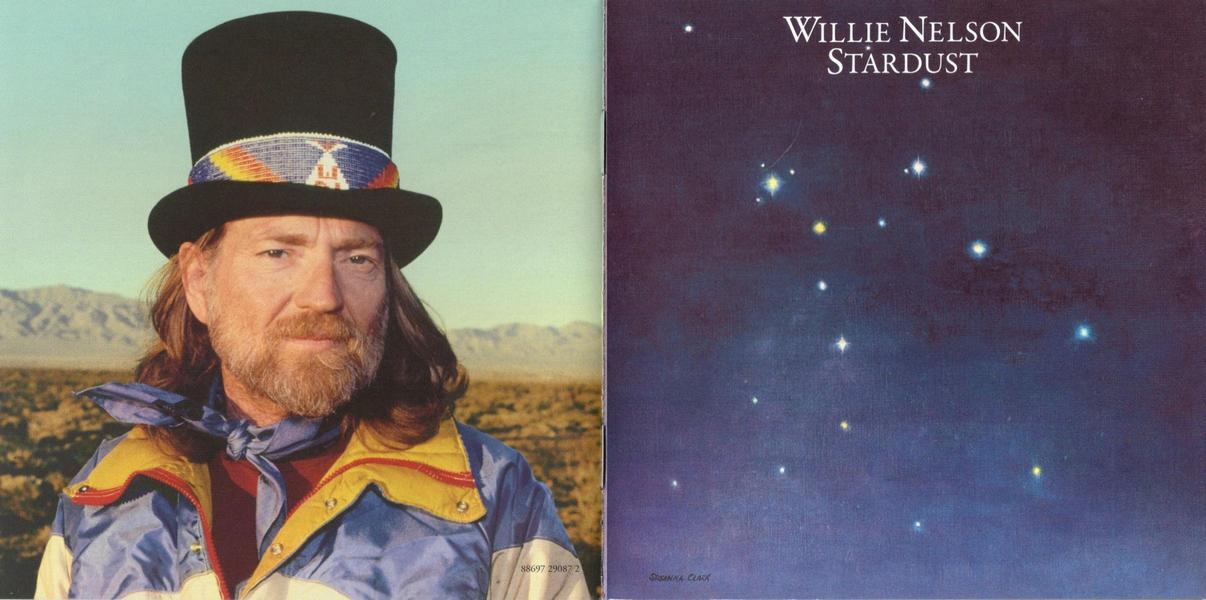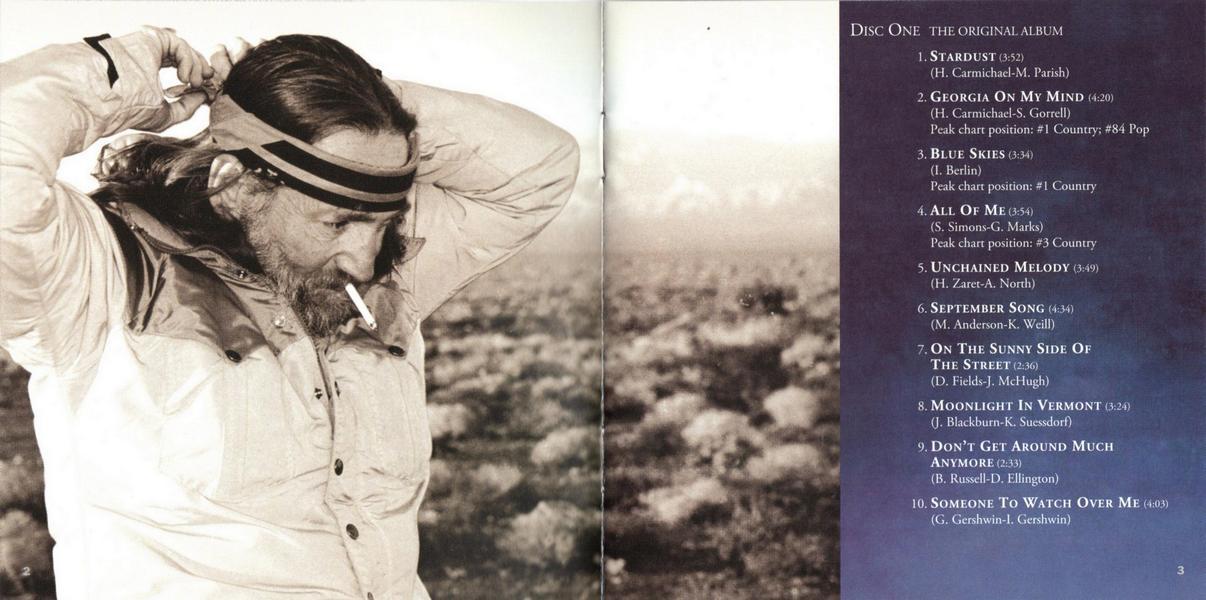

|

|

|


|
| more images |
Sleeve Notes
In 1975, Willie Nelson at last realized his quest to make records on his terms with his Columbia album Red Headed Stranger and the hit "Blue Eyes Crying In The Rain." He and compatriot Waylon Jennings had proven beyond a doubt that at least some Nashville artists could plot their musical destinies free of interference by control-freak Music Row producers.
Move ahead to 1978. Willie's in Nashville telling Rick Blackburn, Columbia Nashville's head of marketing (he'd later run the whole Nashville operation) of plans to record an album of his favorite classic pop tunes, written by Hoagy Carmichael, George Gershwin and Duke Ellington, none renowned for racking up hit country singles. Nashville's establishment couldn't dispute Willie's successes; his contract guaranteed creative control. Still, Blackburn recoiled at what seemed an odd idea: the label's biggest country asset, with proven appeal to rock fans, doing a 180 into uncharted territory. As an unnerved Blackburn argued hard against it, Willie biographer Joe Nick Patoski chronicled Willie's simple response: "Why be predictable?"
Actually, the whole idea was less radical than it might have seemed. Early 20th Century country stringbands occasionally played and even recorded pop songs. The '50s brought entire albums of pop standards from Ferlin Husky, Eddy Arnold, Faron Young, Marty Robbins and Jim Reeves. Patsy Cline peppered her performances with pop tunes and recorded a few. Willie, a lifelong admirer of Frank Sinatra, dabbled in pop as early as 1963 when, near the end of his contract with Liberty Records, he recorded the standard "Am I Blue" with strings.
Even so, other aspects of Stardust were less conventional, one being his choice of producer: organist Booker T. Jones, whom he'd met in Malibu, where each had an apartment in the same building. His former band, iconic '60s Memphis instrumental quartet Booker T. & The MG's (with Steve Cropper and Duck Dunn) gained fame through instrumental hits like "Green Onions." As the core of Stax Records' house band, they accompanied Otis Redding, Wilson Pickett, Sam & Dave, Eddie Floyd and Carla Thomas on their biggest hits.
Beneath Booker's R&B credentials was a classically trained musician whose tastes extended beyond blues and R&B into pop and country and who already knew Willie's music. Together, they crafted an exquisite collection of ten standards, inspired by the paradigm set by their mutual hero Ray Charles, who'd proven his skills in erecting a barrier-free musical tent embracing pop, jazz, rock, R&B and country.
Given Willie's dismal past experiences with Nashville producers, it might seem weird he selected any guiding hand but his. Yet in discussing Stardust in a 1994 interview, he revealed more nuanced feelings on that subject. "It's not everybody that really knows what they want to do when they get in (the studio), and they need a good producer," he told me. "I don't know what I want to do every time when I go in there, either. Just like when I went in with Booker T. &mash; I needed him. So every guy needs a producer sometimes," he added. "But sometimes, he knows what he wants to do and he should have the freedom to go in and do it. I think a producer most of the time knows when an artist has the ability to do that, and a good producer will let him do it and then jump in there and take credit for it."
Willie and his touring band recorded the basic tracks at the home of producer Brian Ahern, then husband of Emmylou Harris, whose mobile recording unit captured the music. The band approached all ten songs with a clean sense of economy. Nor did it hurt that this was familiar turf for his sister Bobbie Nelson, who'd played these songs in her previous life as a lounge pianist. Harmonica player Mickey Raphael added consistently sympathetic accompaniment. Booker's arranging skills enabled him to devise creative orchestrations enhancing both singer and song as Willie, himself a fine lyrical craftsman, performed these ten ageless tunes in his usual style. Sinatra once explained the keystone of his approach to nearly every song he interpreted: respect both the lyric and composer. Never once did Willie forget that rule.
Hoagy Carmichael's "Stardust," written in 1927, began as a moody jazz piano instrumental and evolved into one of the greatest of all pop standards after Mitchell Parish added the unforgettable lyrics. Following a set of introductory guitar arpeggios, Willie approaches the lyric with an austere dignity, Booker's organ flowing ethereally beneath the vocal and Raphael tastefully filling in the quiet spots. The strings are audible, yet remain in the background.
Carmichael's friend, jazz bandleader Frankie Trumbauer, suggested in 1930 that he pay homage to the Peach state. "Georgia On My Mind," written with Stu Gorrell, became a bestseller for Trumbauer's orchestra and later for Gene Krupa's swing band, but didn't reach standard status until Ray Charles's riveting, chart-topping 1960 performance demonstrated the song's full potential. Willie spins it his way, a spare performance framed by strings, Raphael and, at the end, Memphis-style R&B horns, making it his &mash; and the first single written by Hoagy Carmichael to top the Country charts.
In Willie's hands, "Blue Skies," a tune by Irving Berlin, still considered the Gold Standard for American composers, receives a funkier package. Even with strings, the beat and Raphael's playing inject a degree of grit as Willie bears down on the lyric and adds an astringent guitar break. As with "Georgia," Willie gave Berlin, who turned 90 in 1978, his first #1 country single. Louis Armstrong, who defined jazz trumpet and a good bit of the idiom itself, made "All Of Me" successful in 1931. When Sinatra later revived it, the tune remained in his stage repertoire.
Following a guitar-harmonica intro, Willie gently swings through the lyric, Booker's keyboard burbling beneath. The first guitar break is melodic but as the song ends, Willie plays it out with a jazzy feel echoing his instrumental hero, gypsy jazz guitarist Django Reinhardt. It became the album's third Country hit in a row.
By comparison, "Unchained Melody" was a newer number. A 1955 hit for R&B singers Al Hibbler and Roy Hamilton, the Righteous Brothers' 1965 Top Five pop version truly established it. Willie wraps a plaintive pain around the lyrics that reminds of, yet never mimics, earlier renditions. Perhaps the album's biggest surprise was "September Song," cowritten by German-born Kurt Weill and lyricist Maxwell Anderson for a 1930s Broadway musical; it had been a Top Ten for Sinatra. Bobbie kicks it off, remaining close by her brother's somber, nostalgic vocal. Again, Willie accomplished the unexpected: putting a song by the urbane Weill, also co-writer of "Mack The Knife," into the Country Top 20.
Written at the height of the Great Depression, "On The Sunny Side Of The Street'"s jazzy, swaggering optimism aimed to boost the morale of a hurting nation when it became a 1930 hit for bandleader Ted Lewis. Willie savors the lyrics, in front of a loping, relaxed arrangement complementing his trademark behind the beat phrasing. That phrasing meshes flawlessly with "Moonlight In Vermont." Introduced by vocalist Margaret Whiting with Billy Butterfield's Orchestra in 1945, it remains unique among American popular tunes: its complex melody and stark, evocative lyrics without rhyme make it difficult to sing well. None of that, of course, mattered to Willie, whose artless dignity, enhanced by Booker's strings, honors the song and creates an unforgettable performance.
Duke Ellington originally composed "Don't Get Around Much Anymore" in 1940 as an instrumental he titled "Never No Lament." Bob Russell's lyrics led to a title change, and the Ink Spots' 1943 vocal hit introduced it to the world. Willie's jaunty, good-humored reading enhances the lyric, as does the straight-ahead, engaging accompaniment. The album closes on a subdued note with George and Ira Gershwin's immortal, aching love ballad "Someone To Watch Over Me." Written for a 1926 Broadway musical, it became one of the Gershwin brothers' most enduring numbers with male and female singers alike. As with "Vermont," Willie handles it with a plaintive sense of reverence.
With a captivating cover painting by Susanna Clark, the wife of Texas singer-songwriter Guy Clark, Stardust became both an unexpected and in some ways, unbelievable artistic triumph for Willie. His crowning achievement, it spent over two years on Billboard's Top LPs chart and over a decade on their Top Country Albums chart, affirming the fact that quality songs, their origins and age be damned, can succeed in any context if performed this well. RCA's 1976 anthology Wanted! The Outlaws, a repackage of older recordings by Willie and Waylon with added material by Jessi Colter and Tompall Glaser, became the first country album to sell a million and reach Platinum status. Stardust s five million-plus would earn it quintuple platinum status.
It didn't end Willie's dalliance with pop material. Disc Two offers the best of other pop performances from 1976-1989: 16 tunes dating from the 1920s to the 1960s featuring diverse arrangements, ranging from full orchestral treatments to blazing acoustic swing and in one case, solo piano. His backup musicians are peerless, many of them longtime Willie associates.
Louis Armstrong's appeal as a singer had long extended beyond jazz. Most mainstream audiences knew him for hit pop vocals like "Hello, Dolly!" "What A Wonderful World," released in 1968 as the Vietnam War escalated, was barely noticed at the time and quickly forgotten. All that changed two decades later when it earned a prominent place in the soundtrack of Robin Williams' hit 1988 film Good Morning, Vietnam. The movie revived enough interest in Armstrong's version that Willie, who liked the song, recorded his own smooth, mellow interpretation as the title song for his 1988 Columbia album.
"Basin Street Blues" dated to 1931, when a New York studio jazz band called the Charleston Chasers recorded it. The vocalist, jazzman Jack Teagarden, was a Texan renowned for both his trombone virtuosity and expressive blues singing. Bob Wills and his Texas Playboys, Willie's lifelong heroes, recorded it in 1936, and Willie's 1986 performance with an acoustic swing band echoes the Wills rendition of half a century earlier. Accompanying him are friends including Paul Buskirk, the mandolin-guitar virtuoso who'd hipped Willie to Django Reinhardt in the '50s, singer-guitarist Freddie Powers, ex-Texas Playboy fiddler Johnny Gimble and members of Merle Haggard's band the Strangers, including country-jazz guitar master Clint Strong and fiddler Jimmy Belken.
"I'm Confessin' (That I Love You)" achieved standard status in 1930 with hits by both Guy Lombardo's Orchestra and Rudy Vallee. Willie's relaxed reading was part of his superb 1981 acoustic jazz album Somewhere Over The Rainbow, conceived specifically to salute Django's gypsy swing with Gimble, Buskirk and Powers as the core of the band. Powers, a Willie friend since the early 1950s, had evolved into a fine songwriter (he later wrote Merle Haggard's hit "A Friend In California") and swinging country-jazz vocalist. Rainbow also featured Willie's comfortably hip take on "I'm Gonna Sit Right Down And Write Myself A Letter," a 1935 best-seller for both Fats Waller and the ultra-hip Boswell Sisters. As Willie and Powers swap verses, Gimble swings away behind them. "Letter," too, broke the Country Top 30.
Willie was just 13 in 1946 when both the Ink Spots and Dinah Shore recorded hit versions of "The Gypsy." His intimate rendition appeared on one of his more obscure albums: 1984's Angel Eyes, a pure jazz effort featuring left-handed Texas jazz guitar master Jackie King, whose fluent bebop adds a deeper texture behind Willie's gorgeous vocal. Nat King Cole sang the ballad "Mona Lisa" for the 1950 Alan Ladd film Captain Carey, USA. The public soon forgot the movie, but not the song. Aside from Cole's #1 pop single, singing cowboy Jimmy Wakely and Texas boogie pianist Moon Mullican had country hits with it that year. Willie's stab at it became Somewhere Over The Rainbow's biggest hit, his elegant, understated performance enhanced by Buskirk's sparkling mandolin.
Composer-singer Johnny Mercer and his sometime collaborator Harold Arlen penned "Ac-cent-tchu-ate The Positive," inspired by a quote from 1940s black evangelist Father Divine. Introduced in a 1944 World War II movie, Mercer, a swinging vocalist in his own right, recorded a #1 single of it for Capitol, the label he co-founded. Willie's laid-back, lilting performance was a perfect fit for Mercer's upbeat lyric. He approaches "Ole Buttermilk Sky," from 1988's The Promiseland album, with a straightforwardness allowing this extraordinary Hoagy Carmichael cowboy tune from the 1946 western Canyon Passage to speak for itself. It spawned hits for Carmichael (who sang it in the movie), and for the big bands of both Paul Weston and Kay Kyser (Kyser's recording including a vocal by future TV talk host Mike Douglas).
In 1975, three years prior to Stardust, Willie revived "That Lucky Ole Sun," a world-weary tune dramatically rendered in 1949 by Frankie Laine as well as by Armstrong and Sinatra. It appeared on his second Columbia album The Sound In Your Mind with Raphael and the pedal steel guitar of Texas western swinger Tom Morrell embellishing Willie's no-frills vocal. His majestic reading of "Little Things Mean A Lot," recorded with full orchestra for his Born For Trouble album, revived a tune originally a 1954 hit for singer Kitty Kallen.
Johnnie Ray's intense, emotional approach to singing ballads made him a revolutionary figure in the pre-Elvis 1950s, and his cathartic 1951 hit ballad "Cry" made him that era's biggest youth idol. Yet in a departure from Ray's wrenching, hyperemotional workout, Willie, who recorded it for his City Of New Orleans album, renders it with stoic dignity. The same applies to "You'll Never Know," a 1943 hit for two of World War II's top male crooners: Sinatra and Dick Haymes. Recorded for the album Without A Song, a follow-up to Stardust produced in a similar mode by Booker T., Willie approaches it in a way that's his own, yet honors both Sinatra and Haymes.
In 1979, two years after Stardust, Willie teamed with friend and rock icon Leon Russell, who'd recorded straight country in Nashville under the pseudonym "Hank Wilson," for a collaborative album titled One For The Road. This wasn't their first time together in the studio. They met in the '60s, when Willie did those sessions for Liberty Records in Hollywood where Russell was a rising studio pianist. The album ran a gamut of classic country, cowboy and rock tunes with forays into the standards explored on Stardust. Three of the many fine numbers from that collection complement the other pop material here.
"Tenderly" was not Rosemary Clooney's biggest hit. Nonetheless, many consider her powerfully poignant 1952 rendering for Columbia to be the definitive version. Willie and Russell surround it with accompaniment evoking Stardust, just as they do with the bluesy "Stormy Weather," first popularized by Ethel Waters and later by Lena Horne. Nelson and Russell strip "One For My Baby (And One More For The Road)," the timeless late-night barroom confessional by Arlen and Johnny Mercer (a hit for Mercer), to its bare essence. As Russell vamps on piano, the pair create a relaxed and intimate 3 AM mood.
The loungey "Angel Eyes," a song of anguished desperation, written by jazz singer Matt Dennis and Earl Brent in the '50s, gained fame through Frank Sinatra's dark, morose rendering on his landmark 1958 all-ballad album Only The Lonely. Willie's terse approach, with a cameo vocal by Ray Charles himself, leaves ample room for showcasing Jackie King's guitar.
At age 75, Willie's own standards "Crazy," "On The Road Again," "Good Hearted Woman" and the rest remain the heart of his musical being. Yet by integrating the Great American Songbook into that rich musical palette, millions today consider him a peer of Charles, Sinatra, Tony Bennett and the others whose explorations of the Great American Songbook assured that it remains relevant in the 21st Century. For him, Stardust made all of that possible.
— Rich Kienzle